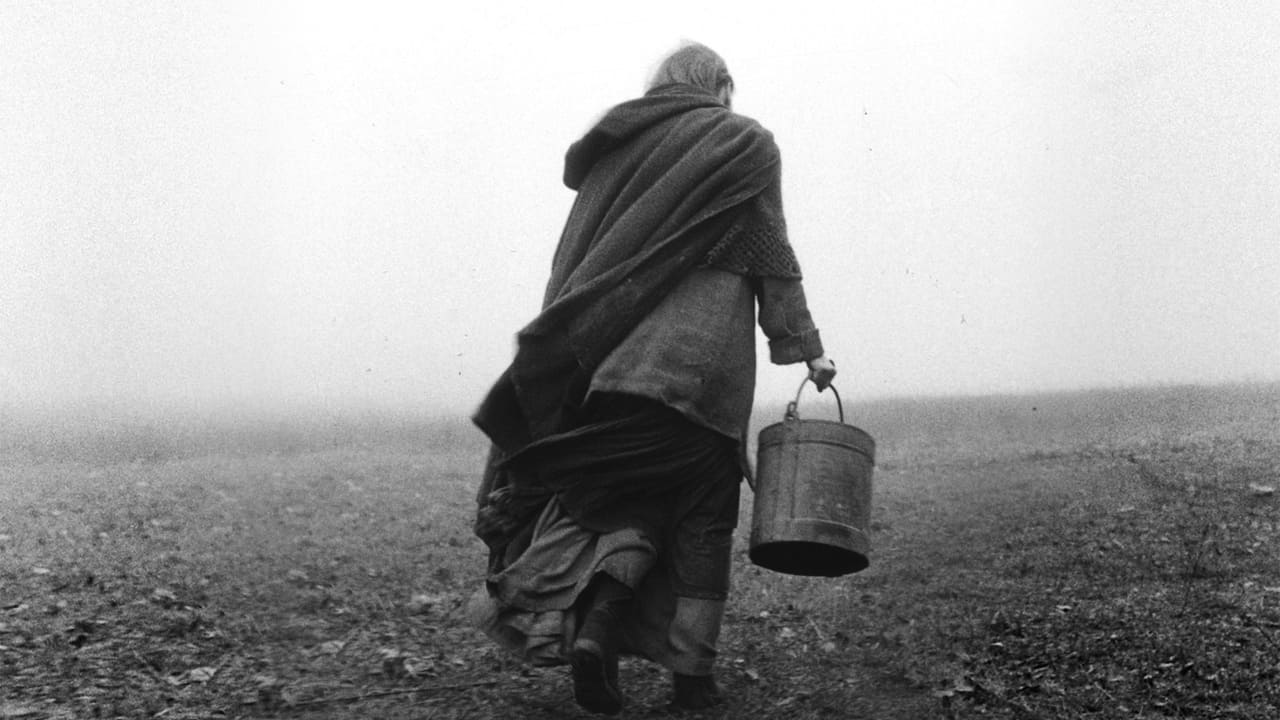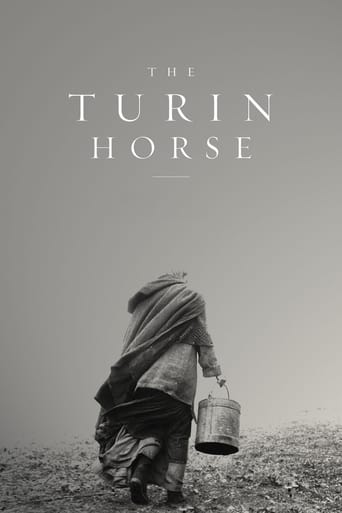

Tied for the best movie I have ever seen
... View MoreThat was an excellent one.
... View MoreExcellent and certainly provocative... If nothing else, the film is a real conversation starter.
... View MoreThrough painfully honest and emotional moments, the movie becomes irresistibly relatable
... View MoreThis is my summary for this masterpiece: This movie is about continuity of discontinuation. Somethings are going to continue to not continue. An experience comparable worth to starting down the road with an empty bag then, over the duration of the movie we see that having it weighed down steadily with rocks until you can't go on.This is Béla Tarr, expressing his way of thinking with this unique way which is using only natural sources of light, calm scenes and long sequences that makes me fall in love with this masterpiece.
... View MoreGirl:What it is Papa? Father:I don't know.. It is my first Bela Tarr movie and I don't think that words can help me to write a review on 'The Turin Horse' and it is my first review. I have been watching movies since my childhood, reading literature and philosophy in order to understand human condition but the visual and sound sensation I have had with 'The Turin Horse' is matchless. There is a modern novel in which a girl commits suicide because she think that she had to brush her teeth everyday with the same brush. Bela Tarr's characters are eating raw potatoes everyday,fortunately they don't commit suicide but what is the point in living? Bela will compel you to think about it. Father: Eat. we have to... To be very honest 'The Turin Horse' is the most powerful work of cinematic art I've ever came across, it is not social but ontological rather cosmological. What it is to be human? Want to know? Go and watch it, the 'heaviness of human existence' to put it in Bela's words.
... View More"The most terrifying fact about the universe is not that it is hostile, but that it is indifferent. But if we can come to terms with this indifference and accept the challenges of life within the boundaries of death — however mutable man may be able to make them — our existence as a species can have genuine meaning and fulfilment. However vast the darkness, we must supply our own light." - Stanley Kubrick "Should I kill myself, or have a cup of coffee?" - Albert Camus Everyday is the apocalypse in Bela Tarr's "The Turin Horse". It opens with a parable about philosopher Friedrich Nietzsche, who encountered a horse being beaten in Turin, Italy, in 1889. The horse refused to work, refused to move, leading to repeated whippings by its owner. This sight led to Nietzsche spiralling into mental illness, depression and finally death. But why? "The Turin Horse" has been compared to Robert Bresson's "Au Hasard Balthazar", a film in which a donkey is incessantly abused by human beings. Tarr's horse is similarly treated, but its response is radically different. Bresson's donkey accepts and largely doesn't understand its fate. Tarr's horse, however, is a perceptive steed with the disposition of a four legged philosopher. His horse slips into depression, suffers an existential crisis and refuses to work, eat or even continue living. The horse, in short, rebels against its owners and life itself; it will not play.Suicide is also the final act of the horse's owners, an elderly cab driver (Janos Derzsi) and his daughter (Erika Bok). They live in a stone cottage which is incessantly pummelled by powerful gusts of wind. Inside the house, father and daughter huddle in the flickering light of lanterns. Outside the house, reality reveals itself to be malevolent, violent, dark and cold. The wind never steps, there is no respite, and the duo seem to expend all their energy attempting to resist it. Eventually, like the horse, they give up. Tarr's early films were explicitly political. As his career progressed, his films became increasingly abstract and metaphysical. For Tarr, a pessimist, politics offers no solution to humanity's problems. It is not simply that the horse is both beaten and exploited by others, but that a hostile universe, for Tarr, necessitates or causes man to exploit man, father to exploit daughter, man to exploit animal. Indeed, sharing water and brandy with "neighbours" and "strangers" is partially what leads to the father and daughter's demise. For Tarr, the sheer nature of Nature corrupts everything, everyone and every relationship. Everyone is at war, the film's nihilism echoing Schophenahuer and Nietzsche at their worst."The Turin Horse" is comprised of thirty long takes. Most of the film's action is intentionally repetitive, Tarr's characters trapped in their private Sisyphus myth. As is typical of Tarr, the film's shot in inky blacks and austere whites. Its cast, with their magnificent beards and sad eyes, recall Dreyer's "Ordet", and the spiritual but existentially brutal films of Bergman, Bresson and Tarkovsky. Tarr's outlook is much more defeatist, though. One character speaks of civilisation's drive to "acquire", "corrupt" and "debase", but the film's scorn goes far beyond systems of social organisation. "Everyday is the same, then you just disappear," Tarr would say in interviews. "There is no apocalypse...this is all I wanted to say." Such a stance was routinely espoused by philosopher Arthur Schopenhauer, who viewed the world as a penal colony in which pain must outweigh enjoyment, an assertion which he recommended be tested by comparing the feelings of an animal engaged in eating another with those of the animal being eaten."Turin" itself ends with "eating". Here the father and daughter sit at a table. "Even the embers went out," she says, referring to a dead lamp. "We have to eat," he recommends. But they don't. After all, what's the point? Fittingly, the film is structured as a series of "six days", reversing the Old Testament's six days of creation and seventh day of rest. Here, the Earth slides toward oblivion, followed by a day of total silence."The Turin Horse" was released in 2011, a year in which many similarly themed films were released, most notably Lars von Trier's kitschy "Melancholia", Abel Ferrara's "Last Day on Earth" and Brad Anderson's humble "Vanishing on 7th Street". Documentary cinema at the time was similarly rife with flicks heralding the apocalypse, usually due to environmental or financial catastrophe. All these films are heavy on doom and light on courses of action. "The Turin Horse" was Tarr's final film before retirement.7.9/10 – See "Ghost World", "A Prairie Home Companion", "Man Push Cart", "Papillon" and "Red Desert".
... View MoreI found this film is good, it's makes me thank god Now there is one laughing mistake The door of the poor house have a modern lock With face plate, latch, dead loch, "modern" lever handle and cylinder. The lock is not fitted with the very poor door and house it's strange scene in the middle of that all miserable live in all during the movieThere is a big question about why's the father and daughter return to their home although the changed what is happened. Is that the wisdom of dying in the land of grandfathers, and so whatever. I cannot touch the relation between Nietzsche story and a battle to survive in very hard and poor condition
... View More